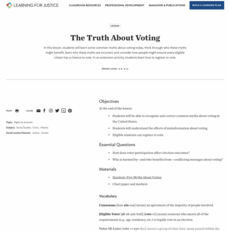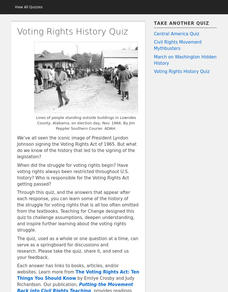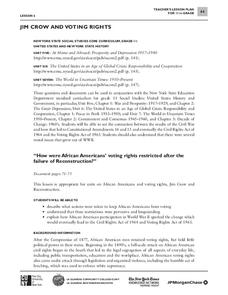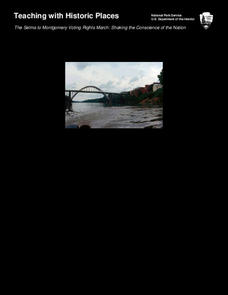Curated OER
Voting and Elections: Vote to Make a Difference
Students use a ballot to make a choice about two items to vote on. In this voting lesson plan, students discuss comparing choices between two items, the benefits and drawbacks to each, and make tally marks to total the votes.
Curated OER
Voting: Your Civic Responsibility
Fifth graders research the viewpoints of the major Presidential candidates. Using this information, they create brochure comparing and contrasting them on important issues. They write a persuasive essay to state the importance of voting...
Curated OER
Why Vote? A Public Awareness Campaign
Young scholars examine the structure of local government and determine why citizens vote. In this civics instructional activity, students listen to a lecture about the structure of local government and then encourage others to exercise...
Annenberg Foundation
Electoral Politics
You won't just get a lesson when you click on this resource. As you click on the related resources located to the left of the screen, you'll find, a professional development video, teacher/student notes, lesson plan, and related reading...
Teaching Tolerance
The Truth About Voting
True or False: Only Presidential elections matter. Academics delve into common voting myths to understand what is true and why the election process is critical to democracy. The lesson uses group discussion, activities, and handouts to...
Curated OER
Using Bar Graphs to Understand Voting Patterns
Bar graphs are used as a way to study voting patterns in the United States. A variety of statistical data is presented in the graphs, and pupils must interpret the data in order to make a report to the class. Three excellent graphs,...
iCivics
Cast Your Vote
Impress upon your learners the importance of researching candidates in an election and considering not only which issues are most important to them as voters, but also which issues are most important to the candidates.
Encyclopedia Britannica
Get out the Vote Campaign
While some of your young scholars may be too young to vote, they can get involved in the election process by creating a nonpartisan campaign encouraging voter registration. After researching how to register to vote, class members design...
Teaching for Change
Voting Rights History Quiz
An 11-question online quiz permits young historians to check their knowledge of the history of voting rights in the United States. After reading a short introduction, individuals click through the questions that test their knowledge of...
PBS
Voting Rights History
New ReviewWhy is voting so important, anyway? Learn more about the importance of exercising a right for which many men and women marched, fought, and legislated with an interactive timeline activity.
Indiana Department of Education
Voting: It's Not a Spectator Sport!
Why is it important to vote? Who is eligible to vote? Why is it that some eligible voters do not vote? Class members conduct interviews with adults and other school mates before researching the eligibility requirements for their state,...
Kids Voting USA
Kids Voting USA: K-2 Classroom Activities
Address both social studies and critical reading skills with a resource dedicated to the voting process, the American democracy, and the ability to evaluate information in order to develop a stance on an issue. Each themed activity set...
DocsTeach
The Voting Record of the Constitution
A piece of the past helps shape the future. Learn what historical documents reveal about the past using an engaging activity. Academics participate in a role-playing scenario, view the voting record of the Constitutional Convention,...
C-SPAN
2016 Electoral College Map
The electoral college can be confusing for citizens of any age. Clear up misconceptions with a handy printable map that details how many electoral votes are allotted to each state, as well as a history of modern elections, complete with...
Curated OER
Suffrage Strategies: Voices for Votes
Students discuss the history and importance of voting. In this voting lesson, students research the women's suffrage movement and the methods used to change people's beliefs about suffrage for women. Students also create posters to...
C-SPAN
Why Do Americans Not Vote in Elections?
In an age of inflamed politics, who votes, who doesn't vote, and why are the questions everyone is trying to answer. Pupils listen to scholars, journalists and data crunchers on voting statistics to make their own conclusions. A chart...
City University of New York
Jim Crow and Voting Rights
Class groups examine primary source documents to determine how the voting rights of African Americans were restricted after the failure of Reconstruction, and how African American participation in World War II lead to change.
Franklin D. Roosevelt Presidential Library & Museum
Voting and Participation in Decision Making
"If you don't vote - you don't count." That's the big idea in this resource about voting and participation in the democratic process. The three included activities focus students on being informed voters, practicing voting for their...
K20 LEARN
Electoral College: Does My Vote Count?
How can a candidate get the most votes, yet still lose the race for the presidency? This is has happened more than once in American history, including in the elections of 2000 and 2016. Using an activity for creating group notes, young...
Curated OER
May The Best Character Win
Students examine the financial committment to running a campaign. They discuss the difference between electroal and popular votes. They realize how involved a political campaign is!
NYC Department of Records
Citizenship and Elections: The Importance of a Ballot
Approximately 58 prcent of those eligible voted in the 2016 US Presidential election. In an attempt to impress upon learners the importance of voting and voting rights, class members examine primary source documents related to the...
C-SPAN
Electoral College Pros/Cons and Alternatives
If every vote counts, why do we need the electoral college? Middle and high schoolers study the Constitutional precedent of the electoral college, as well as its place in historical and modern elections, with an engaging social studies...
National Park Service
The Selma to Montgomery Voting Rights March: Shaking the Conscience of the Nation
Travel back in time to examine how tragic events can spur positive change. Scholars explore the impact of the Selma Voting Rights March, including the tragic loss of life and the later signing of the Voting Rights Act of 1965. Academics...
Curated OER
Our Constitutional Connection Lesson 3: To Vote Or Not To Vote? That is the Question!
Students design colorful posters to "get out and vote" after studying the three amendments to the US Constitution that extend voting rights. They analyze the importance of voting to a healthy democracy.
Other popular searches
- Voting Age
- Voting for President
- Voting and Elections
- Voting Rights
- Voting Process
- Voting Ballot Template
- Presidential Election Voting
- Voting Records
- History of Voting
- Voting Habits
- Voting Rights Movement
- Voting and Democracy

























